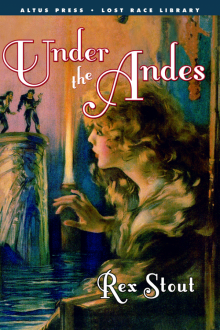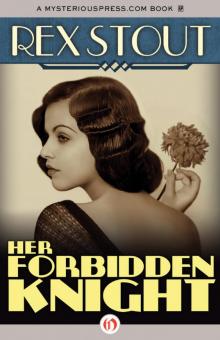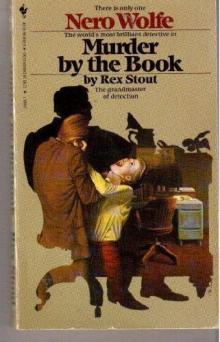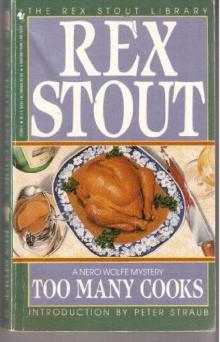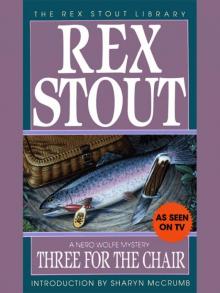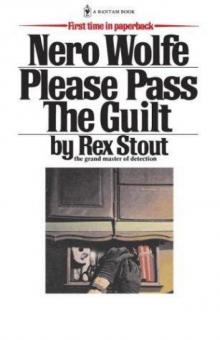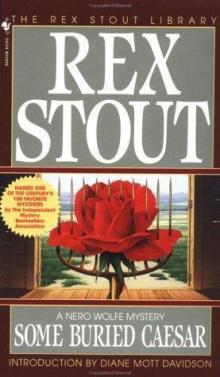Rex stout nero wolfe 0.., p.1
Rex Stout - Nero Wolfe 08 - Where There's a Will, page 1
part #8 of Nero Wolfe Series





Rex Stout
REX STOUT, the creator of Nero Wolfe, was born in Noblesville, Indiana, in 1886, the sixth of nine children of John and Lucetta Todhunter Stout, both Quakers. Shortly after his birth, the family moved to Wakarusa, Kansas. He was educated in a country school, but by the age of nine he was recognized throughout the state as a prodigy in arithmetic. Mr. Stout briefly attended the University of Kansas, but left to enlist in the Navy, and spent the next two years as a warrant officer on board President Theodore Roosevelt’s yacht. When he left the Navy in 1908, Rex Stout began to write free-lance articles and worked as a sightseeing guide and as an itinerant bookkeeper. Later he devised and implemented a school banking system which was installed in four hundred cities and towns throughout the country. In 1927 Mr. Stout retired from the world of finance and, with the proceeds of his banking scheme, left for Paris to write serious fiction. He wrote three novels that received favorable reviews before turning to detective fiction. His first Nero Wolfe novel, Fer-de-Lance, appeared in 1934. It was followed by many others, among them Too Many Cooks, The Silent Speaker, If Death Ever Slept, The Doorbell Rang, and Please Pass the Guilt, which established Nero Wolfe as a leading character on a par with Erle Stanley Gardner’s famous protagonist, Perry Mason. During World War II, Rex Stout waged a personal campaign against Nazism as chairman of the War Writers’ Board, master of ceremonies of the radio program “Speaking of Liberty,” and member of several national committees. After the war he turned his attention to mobilizing public opinion against the wartime use of thermonuclear devices, was an active leader in the Authors’ Guild, and resumed writing his Nero Wolfe novels. Rex Stout died in 1975 at the age of eighty-eight. A month before his death, he published his seventy-second Nero Wolfe mystery, A Family Affair. Ten years later, a seventy-third Nero Wolfe mystery was discovered and published in Death Times Three.
The Rex Stout Library
Fer-De-Lance
The League of Frightened Men
The Rubber Band
The Red Box
Too Many Cooks
Some Buried Caesar
Over My Dead Body
Where There’s a Will
Black Orchids
Not Quite Dead Enough
The Silent Speaker
Too Many Women
And Be a Villain
The Second Confession
Trouble in Triplicate
In the Best Families
Three Doors to Death
Murder by the Book
Curtains for Three
Prisoner’s Base
Triple Jeopardy
The Golden Spiders
The Black Mountain
Three Men Out
Before Midnight
Might As Well Be Dead
Three Witnesses
If Death Ever Slept
Three For the Chair
Champagne For One
And Four to Go
Plot It Yourself
Too Many Clients
Three at Wolfe’s Door
The Final Deduction
Gambit
Homicide Trinity
The Mother Hunt
A Right to Die
Trio for Blunt Instruments
The Doorbell Rang
Death of a Doxy
The Father Hunt
Death of a Dude
Please Pass the Guilt
A Family Affair
Death Times Three
The Hand in the Glove
Double for Death
Bad for Business
The Broken Vase
The Sound of Murder
Red Threads
The Mountain Cat Murders
Introduction
A writer is influenced by everything he reads. Everything. That means not only novels and short stories but newspapers and magazines and cereal boxes and even—God, spare us—the inscrutable scribblings of politicians. If a writer’s dog drags home a wad of old paper which is unappetizing to the human eye but on which the mutt has chewed and slobbered with enthusiasm, the writer will be influenced by whatever he reads between the tooth holes and saliva tracks. Although his conscious mind may be easily bored, his subconscious is a perpetually wonderstruck infant that will find a wealth of fascinating data to store away from that dog-gnawed paper.
Aware that the subconscious is a cosmic sponge, writers are often willing to experience anything in the interest of finding material. They will sail to Burma on a freighter to participate in a yak-heaving contest, subject themselves to a survival trek in the Amazon rain forest where they must eat grub pâté to escape starvation, have the inner rims of their nostrils decorated by a carnival tattoo artist at a county fair-grounds in Alabama, and even watch Phil Donahue—all in the hope that the subconscious will mull over these adventures, discover aspects and achieve insights beyond the perceptive ability of the conscious mind, and generate brilliant ideas for novels or short stories.
Some of these writers, with tiny tattooed flames blazing from their nostrils and their shoulders aching from heaving one yak too many and bits of grubs still stuck between their teeth, will react with horror to the suggestion that they might want to read as broadly as they travel. If one of these scribblers considers himself a “literary” writer, he doesn’t want to contaminate his subconscious mind with an awareness of the styles and prose rhythms of “popular” writers, for fear he might wind up writing a novel that has relevance beyond the insular world of the self-appointed literati or that, God forfend, even has a plot. If he is a science-fiction writer, he may read science fiction to the exclusion of all other forms, convinced that any tale of genetically engineered, brain-eating, laser-toting, cyberpunk aliens with a psychotic need to conquer the universe is certain to be more intellectually stimulating than any story to be found in lesser genres. Some popular writers will not read literary types, partly as a payback for the undeserved insults they have received from those artistes. Some mystery writers will read only mysteries, some Western writers only Westerns, some historical novelists only historicals.
One novelist I’ve encountered is reluctant to read any novels other than his own, for fear of polluting his creative tidepool. If he reads John D. MacDonald, Philip Roth, Charles Dickens, or anyone else, isn’t it possible (he worries) that he will then call forth his own muse only to discover that she is a hideous mutant, twisted beyond all recognition by contamination with those other writers? He apparently functions under the impression that his talent came with an engraved-in-stone stylesheet of prodigious specificity, a gift from God that has acquired no patina from life, and that he would have written precisely the same stories when he was two weeks old as he writes now, if only his fingers had been big enough to deal with a typewriter at that tender age.
When it comes to reading fiction, I am an omnivore, largely because I love to read but also because I fear that reading sparely will result in my writing being shaped by too narrow a range of influences. Unlike the skittish writer in the previous paragraph, I think that by reading everything, I water down the influence of any one writer and thereby preserve my natural voice. For all of my adult life, I have devoured both popular and “serious” fiction, love stories and science fiction, Westerns and horror novels, tales of academic angst and animal stories, stream-of-consciousness self-indulgence and clockwork-mechanism mystery novels, Jim Harrison and Jim Thompson, John LeCarre and John Barth, Philip K. Dick and Philip Roth and Philip Jose Farmer, though I find the recent work of the middle Philip too Philippic.
I have learned a great deal from an omnivorous literary diet, but two lessons in particular apply to this introduction. First, the very best examples of writing from any genre are equal in quality to the best examples from any other genre, and the finest popular fiction is equal to the finest “serious” fiction. The fragmentation of fiction into genres was largely a marketing ploy of modern publishing. Likewise, the division between popular and serious work was a scheme perpetrated by academics in need of creating a false pantheon of living writers when it became impossible to come up with fresh dissertation topics (to earn degrees and prestige) concerning the writers in the true pantheon, who had been analyzed to exhaustion. Second, the more widely a writer reads, the more he learns about craft and technique, and the more interesting and flavorful his style becomes, just as a vegetable soup becomes more interesting with a multitude of vegetables than it is with only, say, lima beans and broccoli.
Twenty years ago, when I was struggling to find my own voice as a writer, I was reading five novels a week in addition to putting in full days at the typewriter. (We didn’t have the great blessing of computers and word-processing software back then. But we didn’t have freeway shootouts or Donald Trump, either, so it wasn’t altogether a less appealing era.) It was exciting to “discover” a great writer like John D. MacDonald, who had a backlist, and read one book after the other to the point of intoxication. Or Donald Westlake. Hammond Innes. Irwin Shaw. John P. Marquand, who wrote the Pulitzer-winning The Late George Apley and other mainstream novels while also turning out Mr. Moto mysteries, which would be impossible in today’s more severely—and absurdly—divided worlds of popular and serious fiction. Robert Heinlein. Evan Hunter, Ed McBain, Somerset Maugham, Keith Laumer, and so many many others.
Rex Stout.
You wondered if I was ever going to get to him, didn’t you? One of the best tricks in a writer’s bag is anticipatio
I think the first Rex Stout novel I read was The Father Hunt, which was published in 1968, when the author was eighty-two years old. It was a Nero Wolfe story, of course, and I was swept away, drawn into the palpable atmosphere of that brownstone house on West 35th Street in Manhattan, where the fat detective and his good right hand, Archie Goodwin, lived and worked. I recall finishing the book with purest delight at what I had discovered (after resisting my wife’s importunings to read one of them for, oh, two or three years), and with dismay that the author was of such an advanced age that he would never be able to write enough in this wonderful series to satisfy my new hunger for it. Then I discovered there were at that time forty-three Nero Wolfe titles, counting collections of novelettes.
Consider that Rex Stout was born in 1886, and did not write his first Nero Wolfe mystery, Fer-de-Lance, until 1934, when he was forty-eight years old, then proceeded to become one of the most widely published and famous mystery writers in the world. Talk about a successful second career! Or maybe it was his twenty-first career, since he sometimes claimed to have held twenty jobs between the time he finished his service in the Navy until he created the fattest and most eccentric and most brilliant detective of all time. More likely mystery writing was his first genuine career, as it cannot have been possible to conduct twenty others between his early twenties and late forties; everything prior to Wolfe was preparation.
By the time I read five of Stout’s mysteries, I realized I was in the hands of a writer who knew a great deal about a wide variety of subjects and was mining extensive real-world experience, but I also knew that he was, like me, an omnivorous reader. His best books glow because of it. They are filled with literary allusions of exquisite subtlety, clever references and associations to the work of myriad other authors, the use of genre traditions in ways that can only be conceived by a writer who knows not merely the genre in which he works but its relationship to all other categories of fiction and to mainstream literature. Understand, he never bores you with his erudition. He never shoves it in your face. It’s possible to read his books, never cotton to a single allusion, and still enjoy the hell out of them. But the reason you can enjoy the hell out of them is because the surface story has all those hidden supports.
I also learned from Rex Stout, among others, that popular fiction, regardless of genre, can be ambitious and can have more than a little something worthwhile to say to the reader. Archie Goodwin (who is, actually, more the central figure of this series than Nero Wolfe himself) is Huck Finn brought into the modern age, Huck with his emancipator’s soul intact but less naive, more cynical—yet strangely more hopeful, too. Nero Wolfe’s exceptional intellect has allowed him to see too deeply into our modern world, and he has turned away from it, perhaps out of despair or disgust or both, taking refuge in a life of special private pleasures of the mind and body, redeemed only by a strict personal code and an adherence to the values that built civilization but which “civilized” society seems to have forgotten or abandoned. Without Archie Goodwin—the archetypal good man who wins; what a name!—Wolfe would be ineffective, a hermit and curmudgeon not worth reading about. Together, each bringing his strengths and weaknesses to the drama, they play out allegories of various aspects of the human condition with a grace that should make this series of novels timeless.
Having said all of this, I would be remiss if I did not warn the new reader that, while always engaging, these are not tales of fast action. They contain little blood—a smear there, a drop here. More often than not, the major events take place offstage, and the lead characters only discuss them after the fact! The pleasure for the reader lies, instead, in the fascination of the characters (which grows with every book one reads) and the play of the mind. The play of the mind … Yet these are not puzzle stories in the classic sense, like some Agatha Christie. In fact you often don’t care that much who killed whom. Stout was concerned more with the why of murder and with exploring how essentially ethical men, like Wolfe and Goodwin, differ from the muck of humanity in their methods of thinking.
I will not claim that Stout’s prose is without fault. For the most part it is supple, so clear that it appears simpler than it really is, and strong. But in some of the books, including Where There’s A Will, the great man trips up and shows us he’s human. For example, Wolfe “snaps” his dialogue when such a manner of speaking is patently impossible; try snapping a line yourself, with the attempt to sound like thumb clicking forefinger or like a mousetrap being sprung, and you’ll see what I mean; only someone wearing bad dentures has a chance of “snapping” out words, much to his embarrassment. But the slips are few and minor, and the story usually sweeps the reader along so well that the flaws are never noticed.
Rex Stout’s Nero Wolfe novels had such an impact on me, in my formative years as a writer, that I now collect the hard-to-get first-edition hardcovers. They are not cheap, these rare volumes. But I’ve had a little writing success of my own, and I would rather indulge a sentimental streak than spend the money on cashmere socks and ancient bottles of bordeaux. If you read my books, you’ll be hard-pressed to see where I write at all like Rex Stout. But a piece of him is in there; believe me.
For better or worse, this is one way a writer lives after his death, other than in his own books: in the indelible imprint he leaves when you crack the covers of his novels and give him the chance to leave his fingerprints all over your soul. It’s not an invasion of privacy, but a small crime of kindness, a breaking and entering with the intention of giving rather than taking.
Enjoy.
—Dean R. Koontz
Chapter 1
I put the 1938–39 edition of Who’s Who in America, open, on the leaf of my desk, because it was getting too heavy to hold on a hot day.
“They were sprinkled at discreet intervals,” I stated aloud. “If they didn’t fudge when they supplied the dope, April is thirty-six, May forty-one, and June forty-six. Five years apart. Apparently their parents started at the middle of the calendar and worked backwards, and also apparently they named June that because she was born in June, 1893. But the next one shows an effort of the imagination. I prefer to suppose it was Mamma who thought of it. Although the baby was actually born in February, they named it May …”
There was no sign that Nero Wolfe was listening as he leaned back in his chair with his eyes closed, but I went on anyhow. On that hot July day, in spite of the swell lunch Fritz had served us, I would have sold the world for a dime. My vacation was over. The news from Europe was enough to make you want to put signs at every ten yards along the seacoast, “Private Shore. No Sharks or Statesmen Allowed.” I had bandages on my arms where the black flies had bored for blood in Canada. Worst of all, Nero Wolfe had gone in for a series of fantastic expenditures, the bank balance was the lowest it had been for years, and the detective business was rotten; and just to be contrary, instead of doing his share of the worrying about it he seemed to have adopted the attitude that it would be impertinent to attempt to interfere with natural laws. Which had me boiling. He might be eccentric enough to find pleasure in a personal and intimate test of the operations of the New Deal WPA, but if I had my way about it the only meaning WPA would ever have for yours truly would be Wolfe Pays Archie.
So I went on buzzing. “It all depends,” I declared, “on what it is that’s biting them. It must be something pretty painful, or they wouldn’t have made an appointment to call on you in a body. The death of their brother Noel has probably taken care of their financial potentialities. Noel’s in here too.” I frowned at the Who’s Who. “He was forty-nine, the eldest, three years older than June, and was next to Cullen himself in Daniel Cullen and Company. Did it all himself, started there as a runner in 1908 at twelve bucks a week. That was in his obit in the Times, day before yesterday. Did you read it?”
Wolfe was motionless. I made a face at him and resumed.











